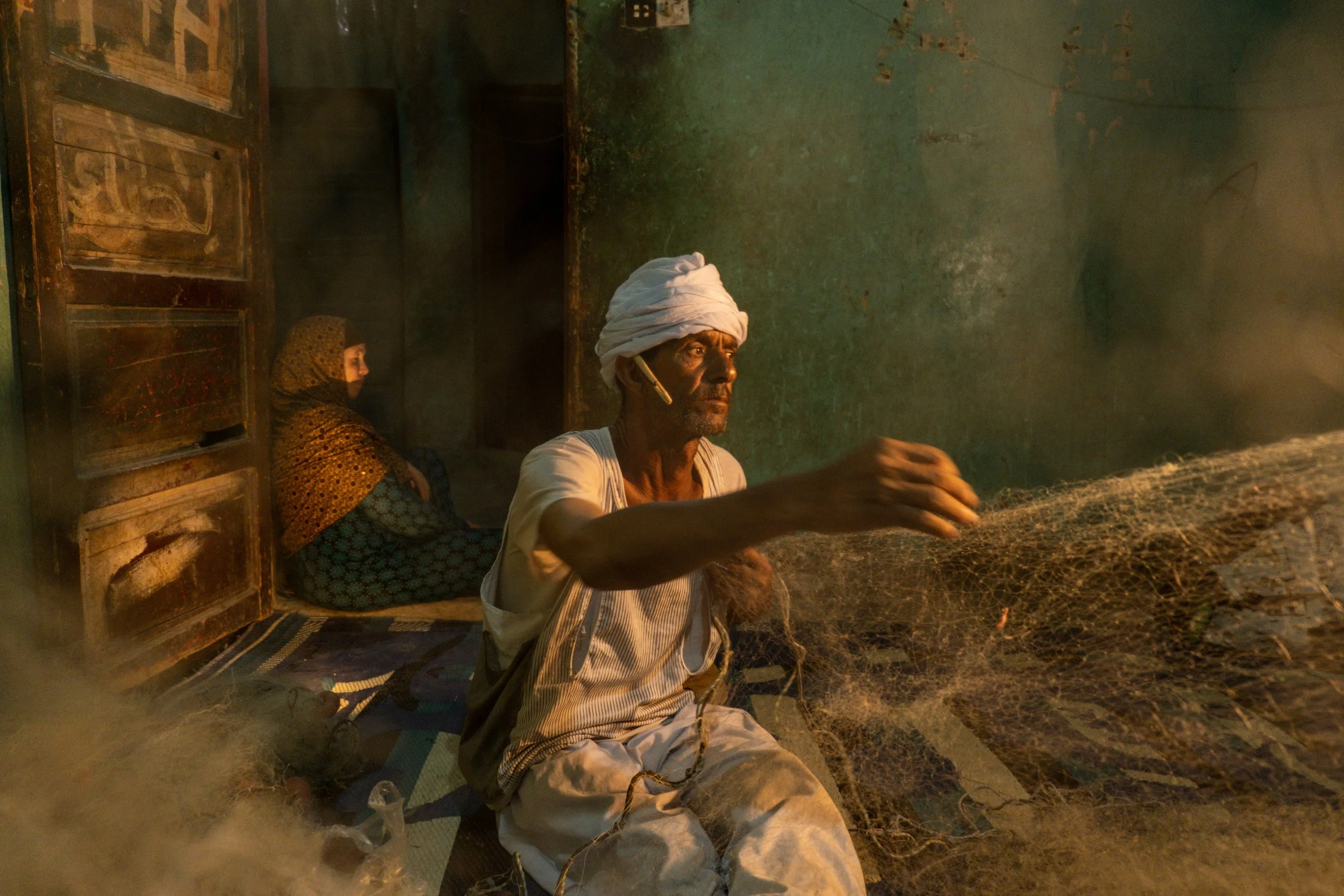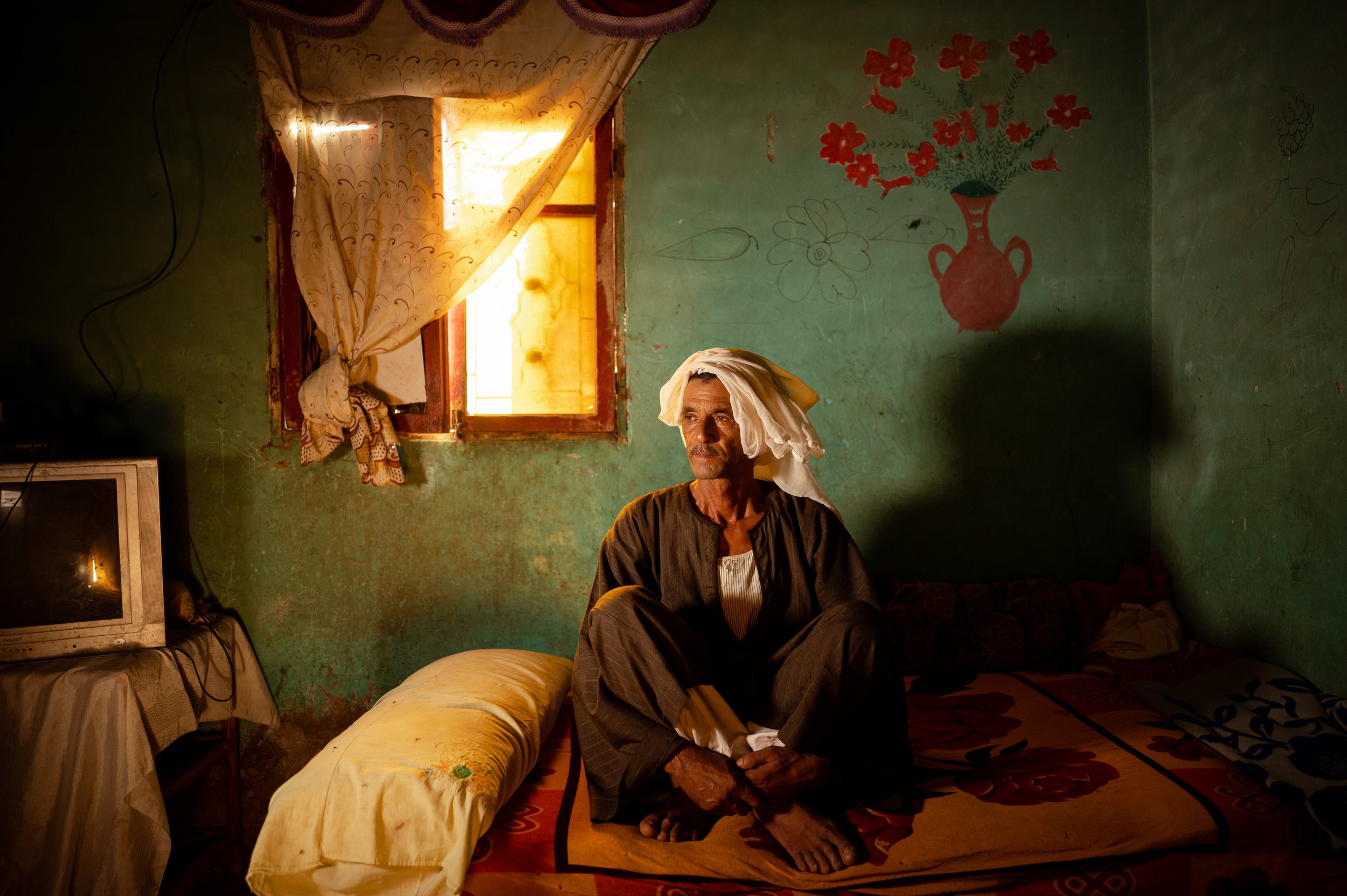
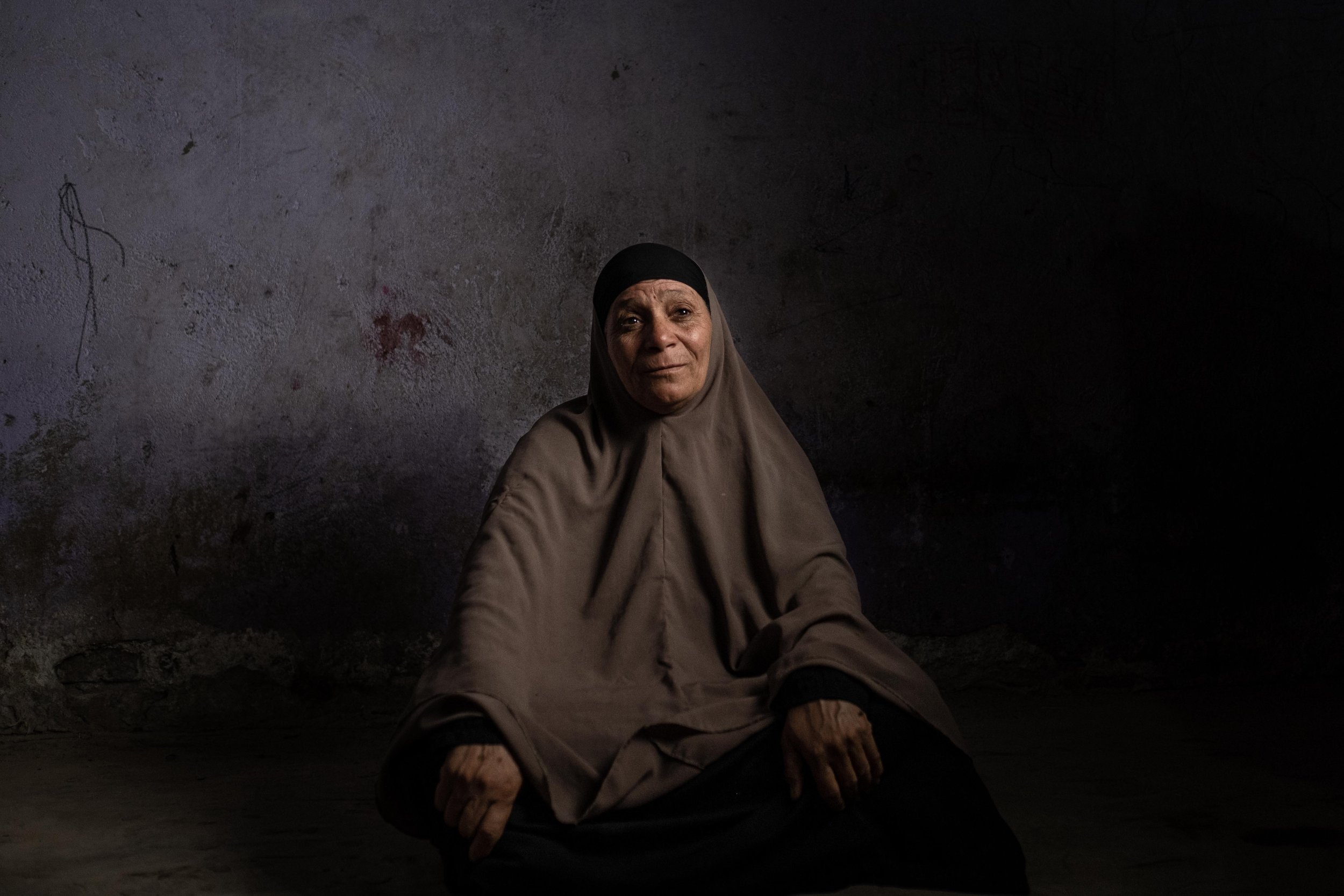
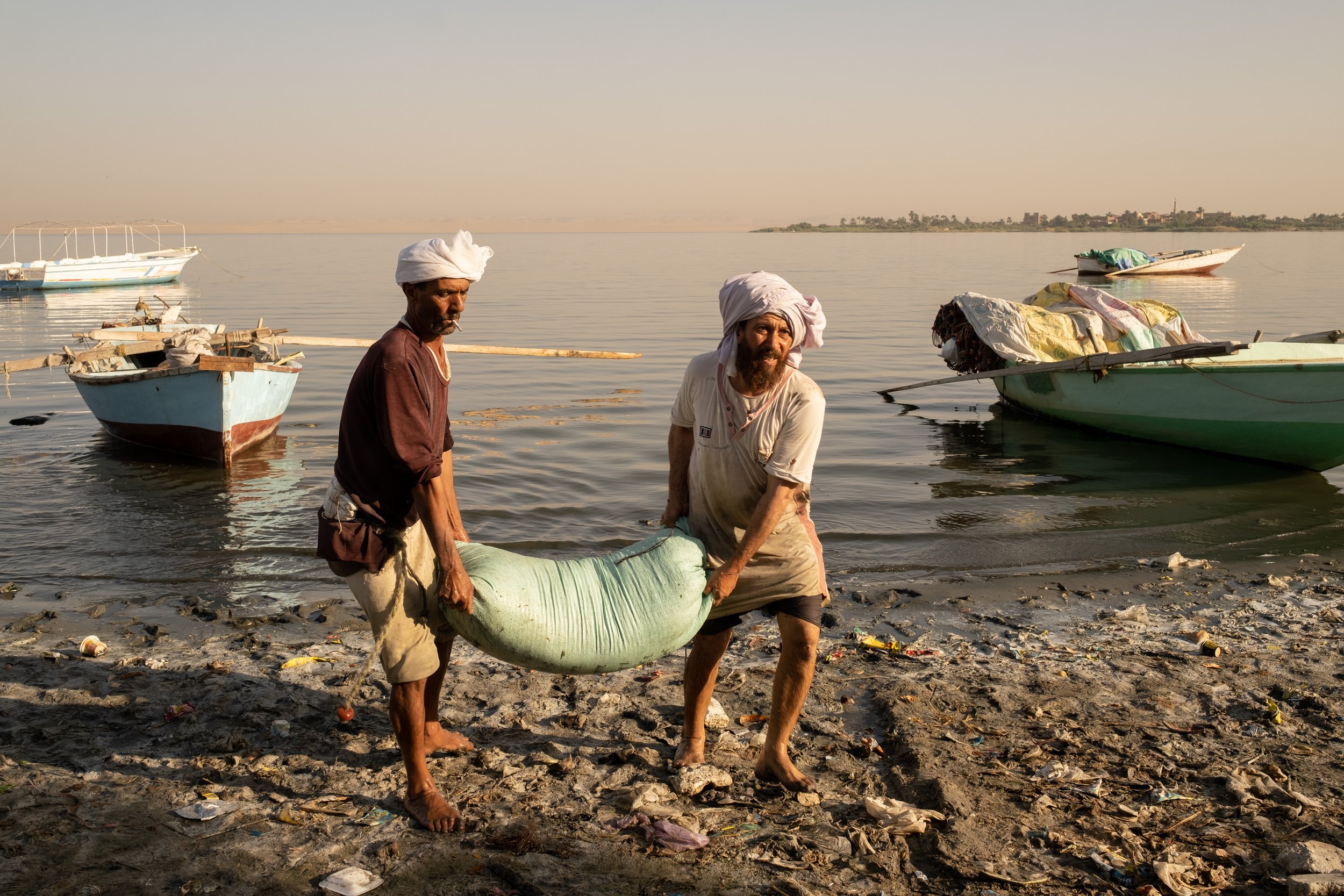
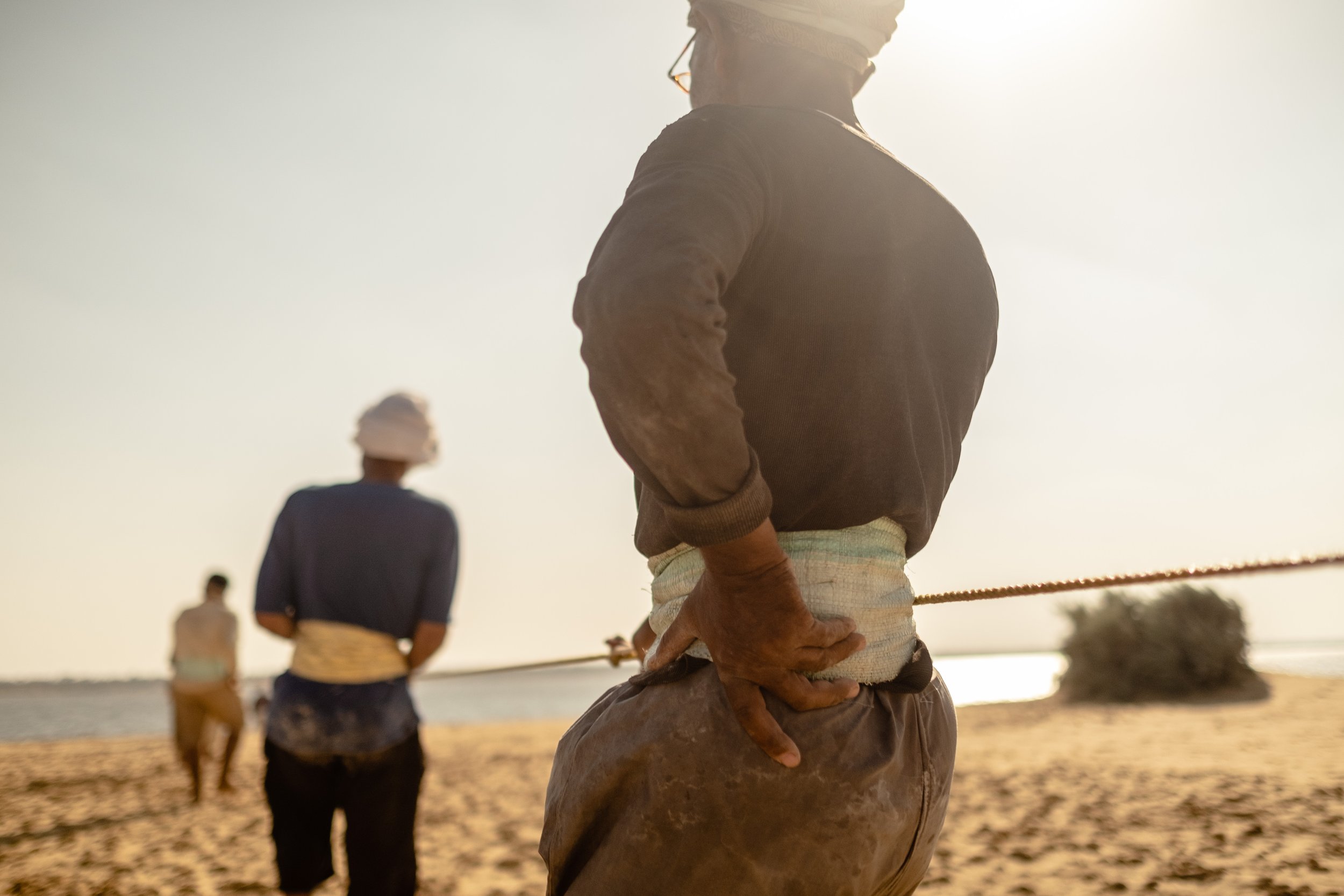
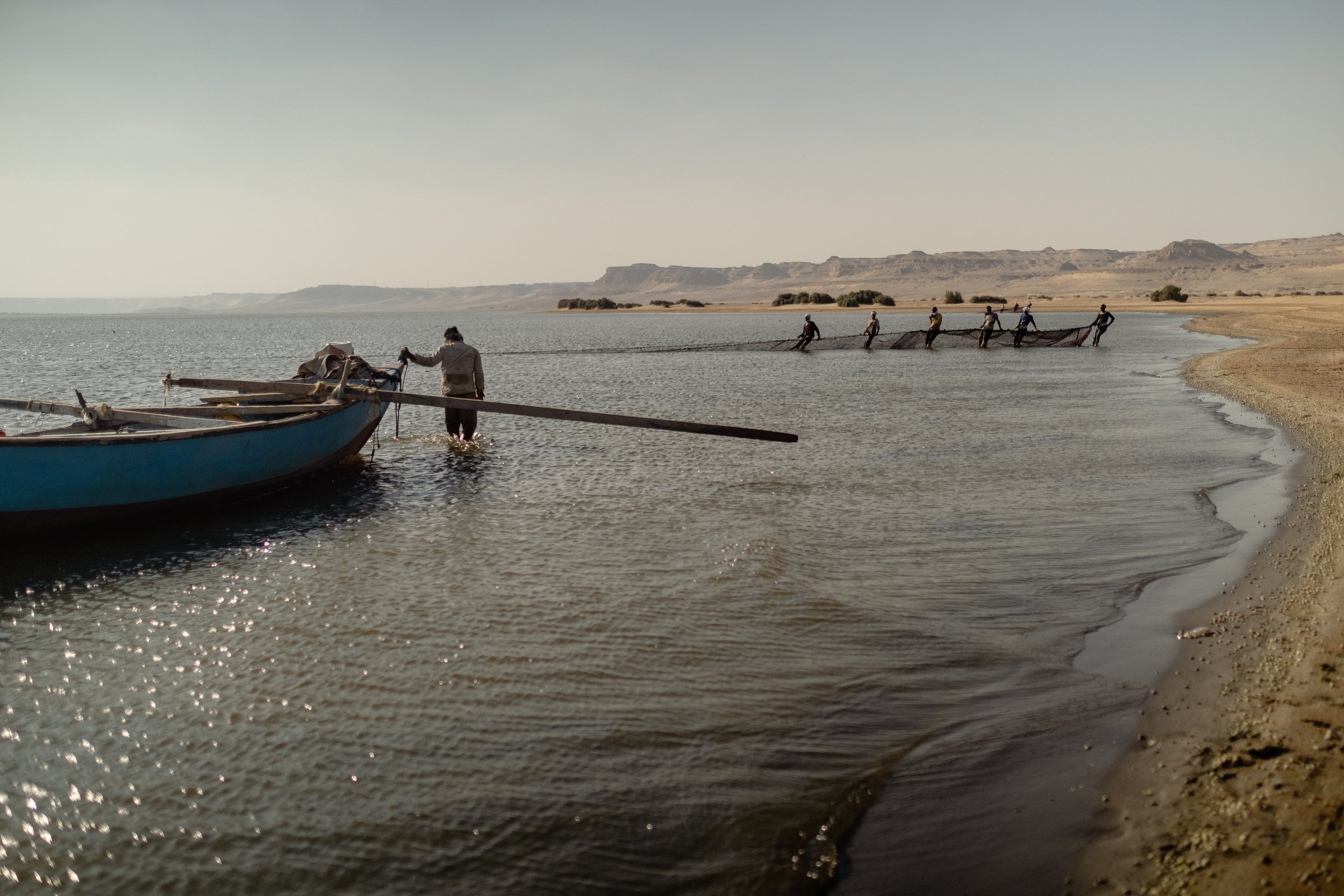
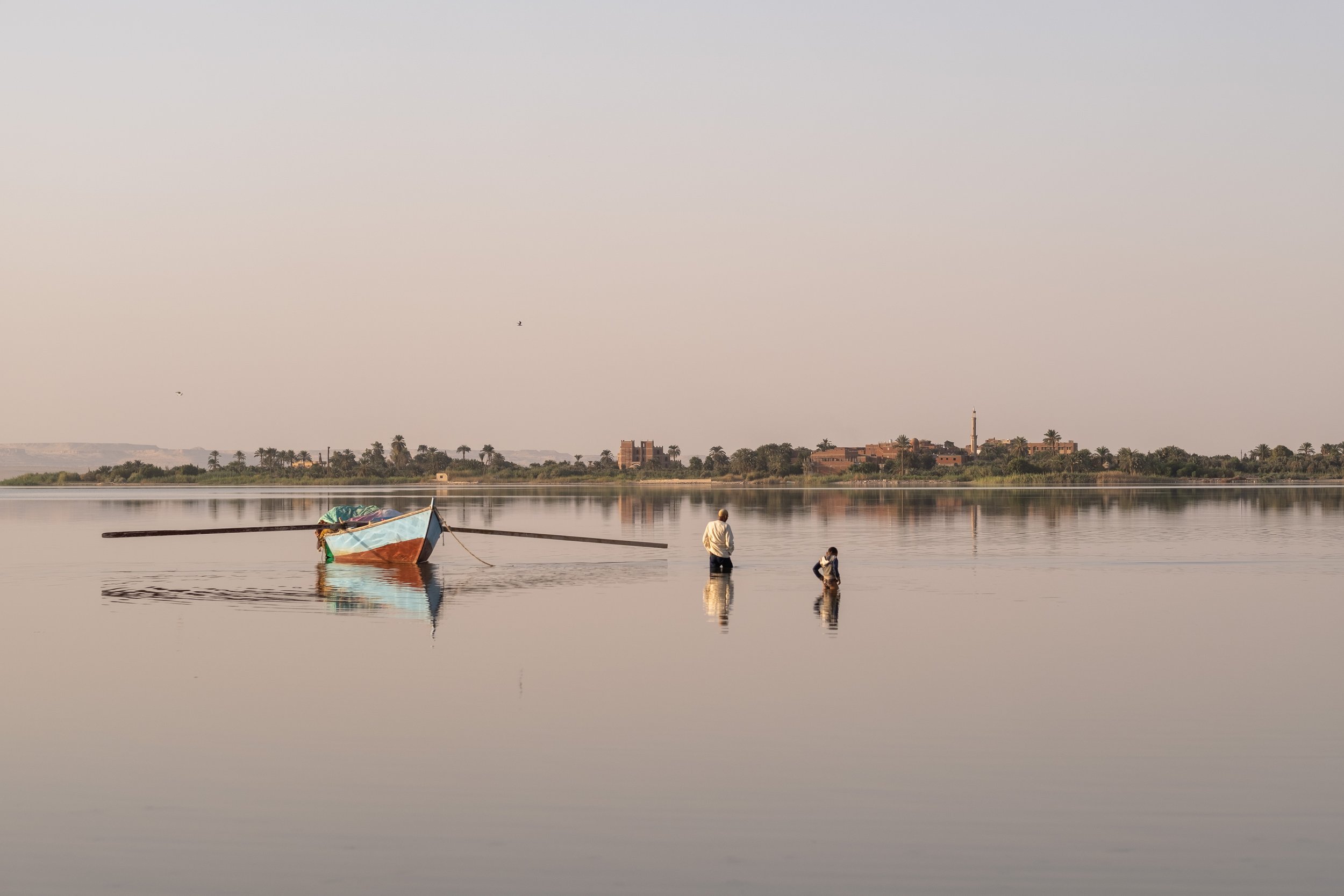
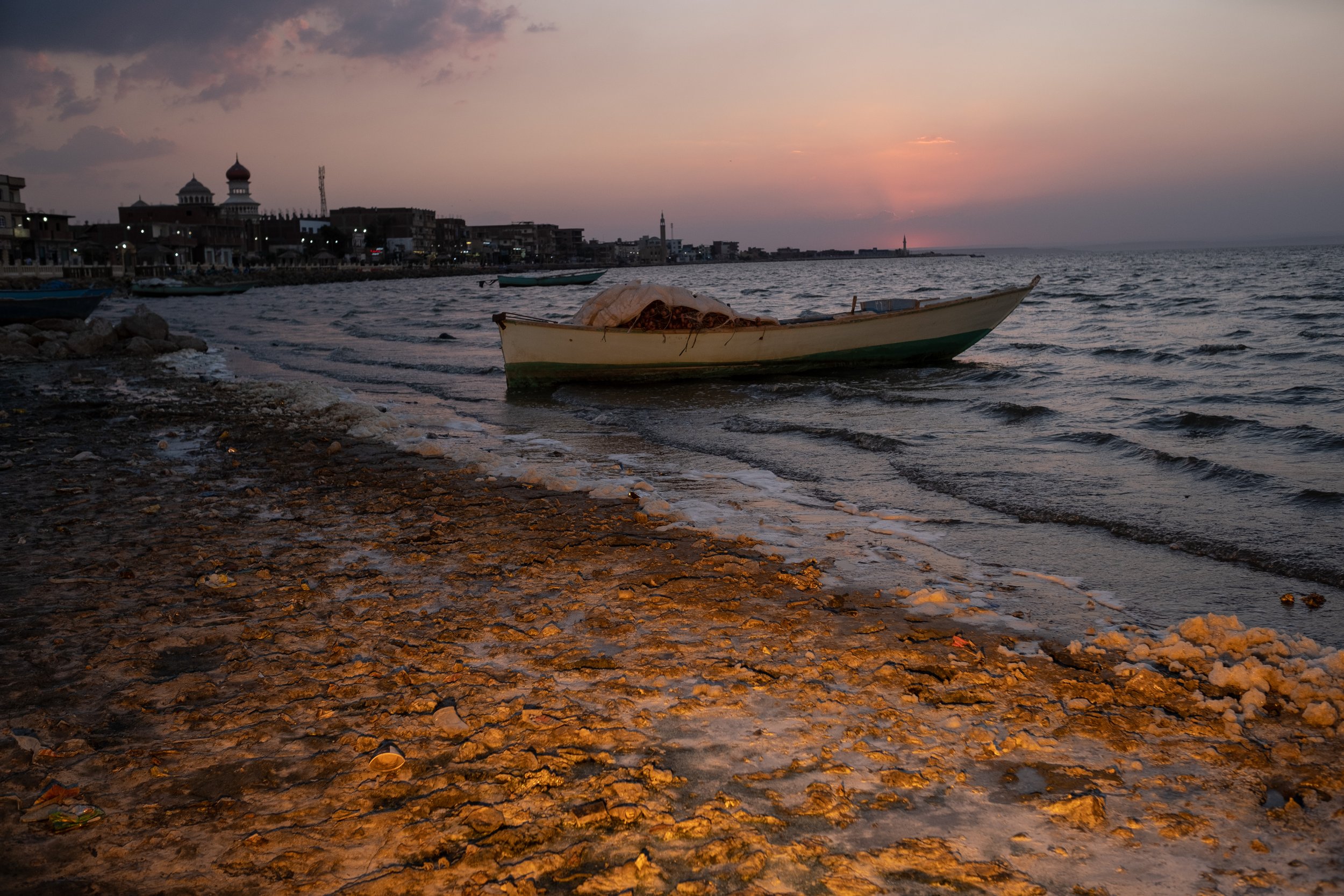
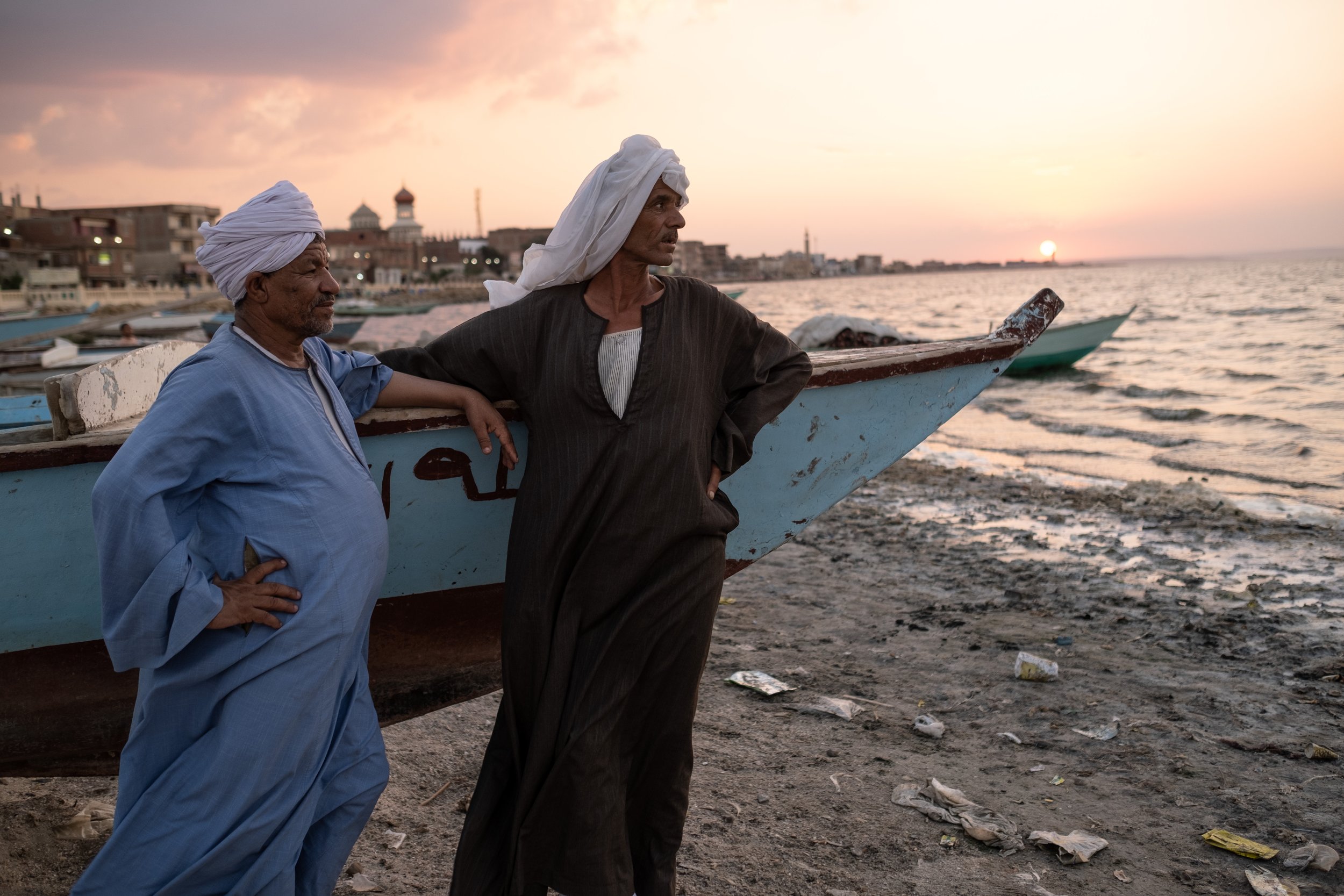
Fatma Fahmy explores new hope for Lake Qarun
IMAGES BY FATMA FAHMY
WORDS BY STEDMAN TABIRI
“People have lost their ancestral roots and their emotional connection to their past.”
Lake Qarun is the third-largest lake in Egypt and is considered one of the oldest lakes in the world; a prehistoric freshwater lake from the era of the pharaohs. Located in the city of Fayoum in southwestern Egypt, it is widely known for its community of fishermen.
Since 1906, Lake Qarun’s salinity has increased, reaching salinity-limit levels higher than seawater. Various fish species have disappeared due to increased pollution from garbage, untreated sewage, agricultural runoff, and industrial waste. Climate change has also contributed to much water evaporation, continually causing the lake to shrink since the start of the 1900s. The various forms of pollution have devastated the lake and caused massive economic and environmental damage.
Sardine on the shore of Lake Qarun, which has been severely polluted, during sunset. Fayoum, Egypt. May 23, 2022.
Many people have lost their livelihoods as fish stocks have sharply declined, and fishermen have been forced to abandon their ancestral home city of Ezbat Soliman near the lake in search of income. Many have relocated to Lake Nasser in the south of Egypt. People have lost their ancestral roots and their emotional connection to their past.
“The first thing your eyes catch when you visit are ships lying on the banks of the lake, and a complete state of stillness...”
Portrait of visual storyteller Fatma Fahmy by Reda Khaled.
Storyteller Fatma Fahmy has memories of visiting Lake Qarun when she started her photography journey in 2014. Though she was simply enjoying the area as a tourist at the time, she was enamoured by the scenery and the livelihoods of the many fishermen filling boats on the water. By 2017, the landscape drastically changed as the number of boats lakeside decreased and the health of the fish declined.
“The first thing your eyes catch when you visit are ships lying on the banks of the lake, and a complete state of stillness except for the movement of children playing in beach clothes,” says Fatma. “Their minds not occupied by the ‘parasite that kills fish’ nor the pollution that sweeps all parts of the lake,” Fatma elaborates.
This pollution has brought a circuit of invasive species such as isopods and jellyfish, which have caused the disappearance of freshwater species. The isopod parasites are known to paralyze and suffocate fish, by reaching onto the gill of the species. The dryness of the coastal area along with the lowering of the freshwater level is another contributing factor to the continuous decline of fish life.
“I went to ask them what happened, they showed me something inside the fish gills, and I was shocked… I know what I saw inside the mouth of [the] fish is Isopoda,” Fatma vividly describes.
As a Revolutionary Storyteller Grant recipient, Fatma wants to restore Lake Qarun, and by doing so, hopes to restore the local community. She also hopes her work will help the world to take notice of climate change. Born in Saudi Arabia, Fahmy is a documentary photographer based in Cairo with a focus on environmental and social issues. Through an ethnographic point of view, Fatma makes images that tap into the memory of a place and its people.
Darabala Abdel Hadi, 61, poses for a portrait on the shore of Lake Qarun in Fayoum, Egypt. He was one of the victims of the progressive deterioration of the lake. Darabala spent the past 20 years as a fisherman with his father in the Lake Qarun area, but fish stocks have declined sharply due to severe pollution and other factors. August 25, 2022.
“The sea is such a great thing to me,” one local fisherman, Darabala Abdel Hadi recollects. “I used to sleep on the lake and not in my house. I adore fishing and the lake. When I go home I dream of the lake.”
The Journal of Egyptian Academic Society for Environmental Development reports the health of Lake Qarun and the wildlife within it are seriously endangered by rising levels of salinity (salt). Furthermore, a parasitic infection that has spread throughout the lake has negatively impacted the lake’s production and fish quality—thereby harming the fishing community in Fayoum.
Following the early stages of the industrial renaissance in Egypt during the 19th century, the lakes in the delta area experienced environmental degradation and brought on health concerns. Although Lake Qarun was designated as a protected area in 1989, it remains vulnerable. With the many construction factories nearby, the lake is highly susceptible to increasing rates of pollution. Not only has this contributed to human health issues, but the once abundant fish life is being affected. This has led to the disappearance of many types of fish, along with the operation of fishing boats—like the ones Fatma fondly recalls—drastically declining from 605 boats to only 10.
Juma Abd al-Jawad’s daughter helps him to remove the salt from under his boat, which has accumulated there in large quantities due to the lake’s high level of salinity. This is due to the decrease in the amount of fresh water flowing into the lake, as well as to global warming, which has increased the evaporation of water from the lake. August 25, 2022.
Historically, the lake has been known as a tremendous source of income for locals and their ancestors spanning across decades, or even centuries. Two-thirds of the village’s population engages in fishing and related activities, including fishing gear manufacturing and fish trading. The fishermen that frequent the area now must seek work in other areas, such as the distant Lake Nasser and Wadi El Rayan. The lake itself is impaired by not only industrial pollution but also by unregulated activities of domestic, agricultural, and industrial waste disposal.
A view of the agricultural drainage flowing into Lake Qarun, where fish stocks have declined sharply. This is due to severe pollution caused by unregulated agricultural, industrial and domestic waste disposal. Fayoum, Egypt. November 17, 2022.
“The sea is such a great thing to me, I used to sleep on the lake and not in my house. I adore fishing and the lake. When I go home, I dream of the lake.”
For 62-year-old fisherman Mamdouh Abdel Aziz, the deterioration of the lake forced him to look for a job elsewhere in Egypt. But, in his older age, he has decided to return to the Fayoum area to fish in hopes of a better outcome for the lake. The negative effects span generations. Mamdouh has two sons that now work at Lake Nasser, where they reside on location for three to four months at a time, taking the long, twelve-hour commute from their village to Aswan. “I wonder, will it return to the way it was, or will we die here without the lake?” Mamdouh ponders.
Mamdouh Abdel Aziz, 62, poses for a portrait near Lake Qarun. He decided to return to the Fayoum area to fish, hoping for the lake’s restoration. May 23, 2022.
“The lake is like my wife. I love it so much, and I hope it returns to the way...it was in the past to revive my soul again.”
Fatma expressed it has been difficult to sway the community to take interest in her project, due to their sense of hopelessness that positive change will come to the lake. For the last five years, numerous media outlets have spotlighted the issue, but meaningful action has been lacking, making people in the area feel doubtful.
“The lake is like my wife. I love it so much, and I hope it returns to the way the lake is back like it was in the past to revive my soul again,” exclaims 43-year-old Sherif Ayed, who has been fishing since he was 15 years old.
By embarking on this project, Fatma wants to reach not only an international audience, but those closer to home in Egypt. Although Fatma has previously held international exhibitions in Paris and the UK, she would like to use the exhibition space to showcase these works domestically. The local villagers are not always educated about natural disasters caused by climate change, as it is not a topic commonly discussed in schools or public settings. Fatma envisions extending the project’s visuals to local places that are dealing with pollution issues, all in the hopes of beginning this critical conversation on climate change.
“I wonder, will it return to the way it was, or will we die here without the lake?”
Fatma carries a lot of hope in this project of restoration. The focus of her work aims to draw attention from relevant and concerned NGOs and organizations. Another priority is to contribute to finding different work occupations for the youth of the village to earn money. The fishermen and villagers are aware of the industrial pollution as they frequently are in talks with the government about this issue in an effort to find solutions.
One fisherman conveys his relationship with Lake Qarun by quoting a song from famed Egyptian singer Umm Kulthum: “‘In the whole world, there is absolutely nothing more amazing than love. We tire, we suffer, we complain, but we still love!’ It is the same for me and the lake,” he says.
Darabala Abdel Hadi, 61, fixes his fishing nets in his house. Fayoum, Egypt. September 08, 2022.
Alongside her passion for photography, one of Fatma’s motivations in pursuing this project is her sense of responsibility. She is able to apply her background in environmental issues and understanding of scientific information to her visually enriching works. “I am fascinated by the power of images, and how each image dictates a story and can actually create a difference,” she passionately explains. “It’s the seconds and the light that is encapsulated that are treasured for as long as the image decides to live. I believe the power of photography comes hand-in-hand with the collective memory of the image itself and the history that is documented.” Fatma intends on standing by the community until the lake is back in the shape it was in its years of splendor. “I hope and I will fight for anything to protect the world from pollution. This is my message as a photographer and an engineer, to protect life for communities.”
Egyptian fishermen taking a boat on Lake Qarun to start fishing at sunrise. Fayoum, Egypt. September 10, 2022.
This story was created with the support of Aesop and our Revolutionary Storyteller Grant.
Support Fatma’s initiative to provide much-needed assistance to Shakshuka village community members whose livelihoods have been impacted by the deterioration of Lake Qarun.









